More Clever Night Light
FleetingThe night light of my kid has:
- a clock that diverges quite fast
- 1 minute per week,
- no memory of the program
- I need to enter the program again after a power outage (and no battery backup),
- no way to program several hours
- for school days and holidays,
an annoying UX :
But it is quite good looking.
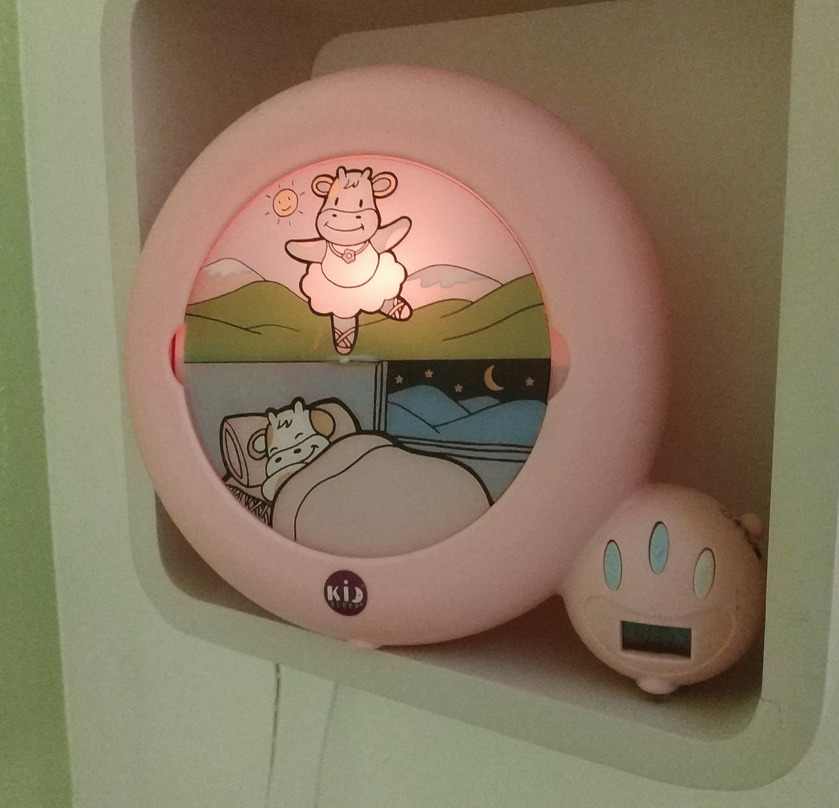
Let’s use its casing to build something that does not have those disadvantages.
I want to have a device that is in general disconnected from the wifi, but that connects for a few minutes every day to fetch the current time.
As it happens, I have an unused raspberry pi 1B that could do the trick. I could later use a smaller devices, like a ESP8266 based board in the future, but that is a story for another time.
lights
first idea -> using the gpio to power a few leds
That will result in a lot of wires, and I’m an not sure that I will have enough brightness.
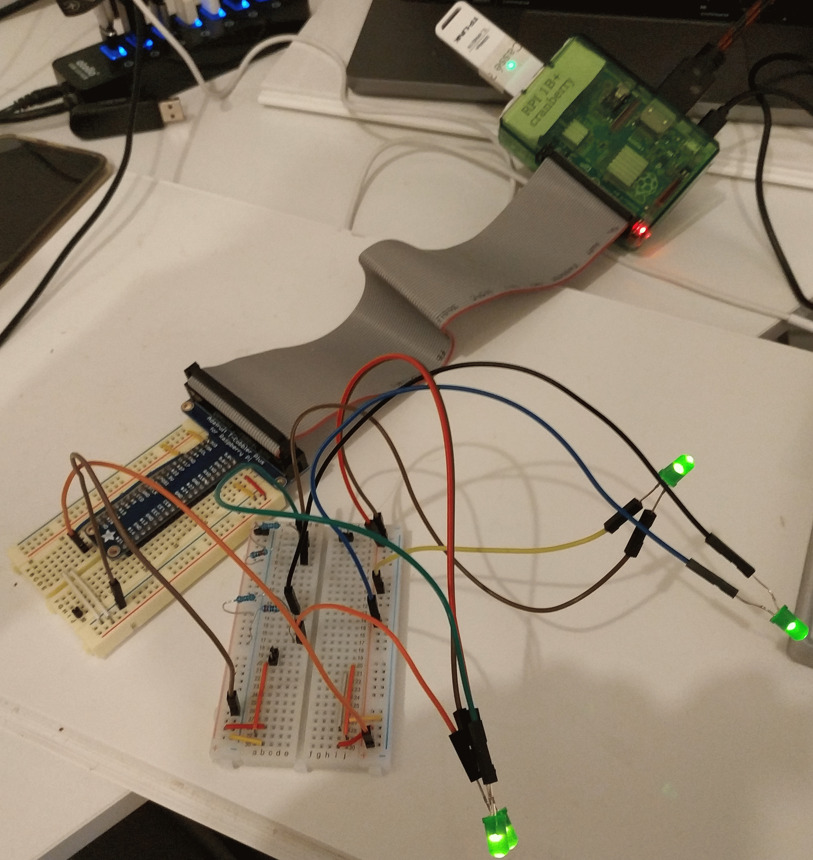
second idea -> use a extra neopixel from my IOT heart project
It looks like it is quite simple according to https://learn.adafruit.com/neopixels-on-raspberry-pi/overview
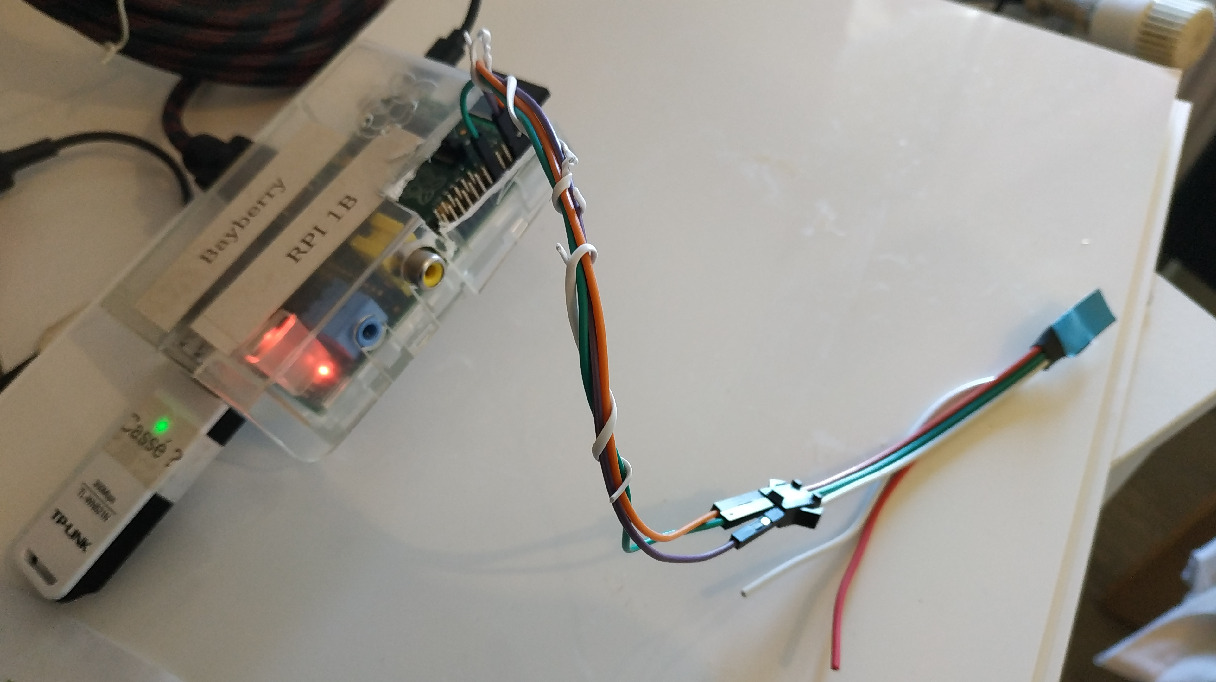
On the raspberry pi 1B, it seems like there is only one pin to deal with pwm, the 18. Hence I suppose I need to follow the advice of disabling the sound1.
ssh bayberry sudo sed -i 's/dtparam=audio=on/dtparam=audio=off/' /boot/config.txt
debugging
need to run in privileged mode
I should be able to run it this way:
docker run --device /dev/mem --device /dev/gpiomem --device /dev/vcio --rm -ti konubinix/neopixel /app/venv/bin/ipython
But somehow, it does not.
Until I fix the line above, let’s simply use the privileged mode.
docker run --privileged --rm -ti konubinix/neopixel /app/venv/bin/ipython
the code
It did not need a lot of iteration to find out the code I wanted.
light on
Lighting on the neopixel is as simple as this:
#!/usr/bin/env python3
# -*- coding:utf-8 -*-
import board
import neopixel
import requests
from datetime import datetime
def main():
pixels = neopixel.NeoPixel(board.D18, 1)
pixels[0] = (255, 255, 255)
print("On")
requests.post("http://192.168.1.46:9705/nightlight", headers={"Title": "nightlight", "priority": "min"}, data=f"{datetime.now()}: On")
if __name__ == "__main__":
main()
The http post here is using ntfy to tell me that everything went well.
light off
And, of course the code of the lightoff program is the same with off instead of on.
#!/usr/bin/env python3
# -*- coding:utf-8 -*-
import board
import neopixel
import requests
from datetime import datetime
def main():
pixels = neopixel.NeoPixel(board.D18, 1)
pixels[0] = (0, 0, 0)
print("Off")
requests.post("http://192.168.1.46:9705/nightlight", headers={"Title": "nightlight", "priority": "min"}, data=f"{datetime.now()}: Off")
if __name__ == "__main__":
main()
Most likely your intuition shouted that this code MUST be refactored. Take a deep breath, think about something relaxing, and you should be good to continue reading this.
almost time
If the lights were only binary, my kid would not want to wait until the light gets on. Per need some way to say “it is almost time, wait a little bit longer”.
Without surprise, this is the same code, with another color.
#!/usr/bin/env python3
# -*- coding:utf-8 -*-
import board
import neopixel
import requests
from datetime import datetime
def main():
pixels = neopixel.NeoPixel(board.D18, 1)
pixels[0] = (0, 30, 40)
print("Almost")
requests.post("http://192.168.1.46:9705/nightlight", headers={"Title": "nightlight", "priority": "min"}, data=f"{datetime.now()}: Almost")
if __name__ == "__main__":
main()
scheduling the changes
I will use cron to run the code. It needs to start the wifi (to send the notification), run the code and shut the wifi down. I actually decided to call the same program 5 times with 1 minute interval. I realized that in some rare occasions, the light did not change. I think the odds that the program fails 5 times in a row are very low.
# m h dom mon dow command
# on school days
29 6 * * mon,tue,thu,fri { date && rfkill unblock wlan ; } >> /var/log/cronlog/log.txt 2>&1
30-35 6 * * mon,tue,thu,fri { date && /app/venv/bin/python /app/lightalmost.py ; } >> /var/log/cronlog/log.txt 2>&1
36 6 * * mon,tue,thu,fri { date && rfkill block wlan ; } >> /var/log/cronlog/log.txt 2>&1
59 6 * * mon,tue,thu,fri { date && rfkill unblock wlan ; } >> /var/log/cronlog/log.txt 2>&1
0-5 07 * * mon,tue,thu,fri { date && /app/venv/bin/python /app/lighton.py ; } >> /var/log/cronlog/log.txt 2>&1
6 7 * * mon,tue,thu,fri { date && rfkill block wlan ; } >> /var/log/cronlog/log.txt 2>&1
14 7 * * mon,tue,thu,fri { date && rfkill unblock wlan ; } >> /var/log/cronlog/log.txt 2>&1
15-19 7 * * mon,tue,thu,fri { date && /app/venv/bin/python /app/lightoff.py ; } >> /var/log/cronlog/log.txt 2>&1
20 7 * * mon,tue,thu,fri { date && rfkill block wlan ; } >> /var/log/cronlog/log.txt 2>&1
# on not school days
29 7 * * wed,sat,sun { date && rfkill unblock wlan ; } >> /var/log/cronlog/log.txt 2>&1
30-35 7 * * wed,sat,sun { date && /app/venv/bin/python /app/lightalmost.py ; } >> /var/log/cronlog/log.txt 2>&1
36 7 * * wed,sat,sun { date && rfkill block wlan ; } >> /var/log/cronlog/log.txt 2>&1
59 7 * * wed,sat,sun { date && rfkill unblock wlan ; } >> /var/log/cronlog/log.txt 2>&1
0-5 8 * * wed,sat,sun { date && /app/venv/bin/python /app/lighton.py ; } >> /var/log/cronlog/log.txt 2>&1
6 8 * * wed,sat,sun { date && rfkill block wlan ; } >> /var/log/cronlog/log.txt 2>&1
29 8 * * wed,sat,sun { date && rfkill unblock wlan ; } >> /var/log/cronlog/log.txt 2>&1
30-35 8 * * wed,sat,sun { date && /app/venv/bin/python /app/lightoff.py ; } >> /var/log/cronlog/log.txt 2>&1
36 8 * * wed,sat,sun { date && rfkill block wlan ; } >> /var/log/cronlog/log.txt 2>&1
# get back online for a short time from time to time to be able to sync back the clock
00 12-22 * * * { date && rfkill unblock wlan ; } >> /var/log/cronlog/log.txt 2>&1
02 12-22 * * * { date && rfkill block wlan ; } >> /var/log/cronlog/log.txt 2>&1
This changes a little bit when the kids are in holiday. I don’t need to wake them up too early then.
# m h dom mon dow command
# on not school days
29 7 * * * { date && rfkill unblock wlan ; } >> /var/log/cronlog/log.txt 2>&1
30-35 7 * * * { date && /app/venv/bin/python /app/lightalmost.py ; } >> /var/log/cronlog/log.txt 2>&1
36 7 * * * { date && rfkill block wlan ; } >> /var/log/cronlog/log.txt 2>&1
59 7 * * * { date && rfkill unblock wlan ; } >> /var/log/cronlog/log.txt 2>&1
0-5 8 * * * { date && /app/venv/bin/python /app/lighton.py ; } >> /var/log/cronlog/log.txt 2>&1
6 8 * * * { date && rfkill block wlan ; } >> /var/log/cronlog/log.txt 2>&1
29 8 * * * { date && rfkill unblock wlan ; } >> /var/log/cronlog/log.txt 2>&1
30-35 8 * * * { date && /app/venv/bin/python /app/lightoff.py ; } >> /var/log/cronlog/log.txt 2>&1
36 8 * * * { date && rfkill block wlan ; } >> /var/log/cronlog/log.txt 2>&1
# get back online for a short time from time to time to be able to sync back the clock
00 12-22 * * * { date && rfkill unblock wlan ; } >> /var/log/cronlog/log.txt 2>&1
02 12-22 * * * { date && rfkill block wlan ; } >> /var/log/cronlog/log.txt 2>&1
starting the container
My raspberry pi is called bayberry and I will control it using ssh.
Let’s provide some room to gather the logs to see if something goes wrong.
ssh bayberry mkdir -p /home/sam/cronlog
Then, the command to start the container is this one:
ssh bayberry docker run --pull always --detach --name nightlight --network host --restart always --privileged --volume /home/sam/cronlog/:/var/log/cronlog/ -ti konubinix/nightlight crond -f -L /var/log/cronlog/cron.log -l 6
It is a bit hairy, but there is nothing out of the ordinary here.
In case I need to refresh the container, I need to stop it beforehand, using that command.
play with it despite its offline state
Once started, it will mostly be offline. So you will need to power off and on again the device to be able to interact with it.
To restore the wlan at startup, I needed to add a command in the host
cat<<EOF | ssh bayberry sudo tee /etc/rc.local
#!/bin/sh -e
#
# rc.local
#
# This script is executed at the end of each multiuser runlevel.
# Make sure that the script will "exit 0" on success or any other
# value on error.
#
# In order to enable or disable this script just change the execution
# bits.
#
# By default this script does nothing.
rfkill unblock wlan
exit 0
EOF
fetching the logs of cron
Simply run
ssh bayberry cat cronlog/cron.log
manually playing with the lights
To light on, I can simply execute
ssh bayberry docker exec nightlight /app/venv/bin/python /app/lighton.py
get an interactive shell (useful to debug)
it is as simple as
ssh -t bayberry docker exec -ti nightlight ipython
hardware setup
Simply drilling a hole into the back of the device
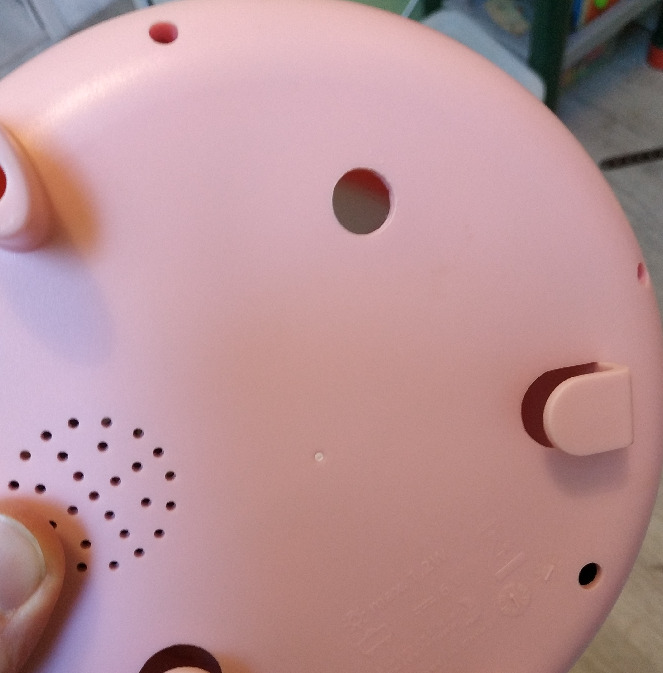
Insert the led strip. And that’s all.

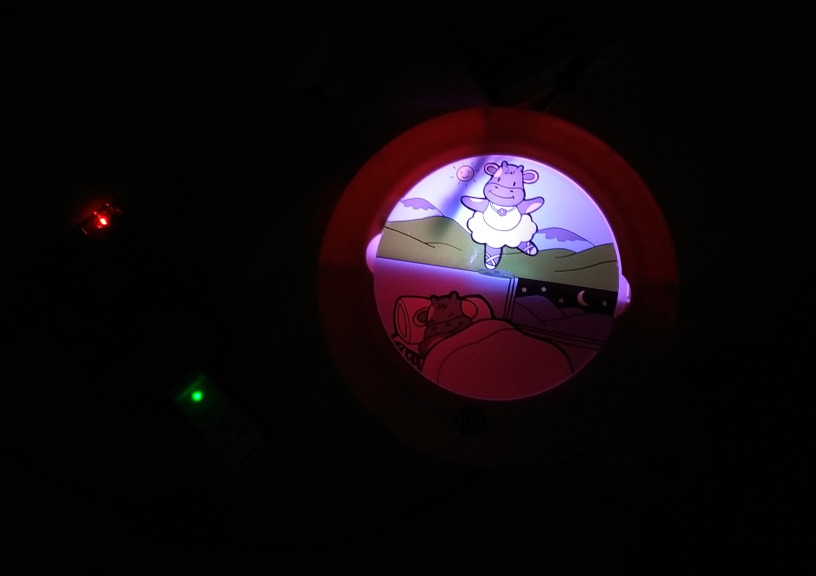
Now, reinstall it
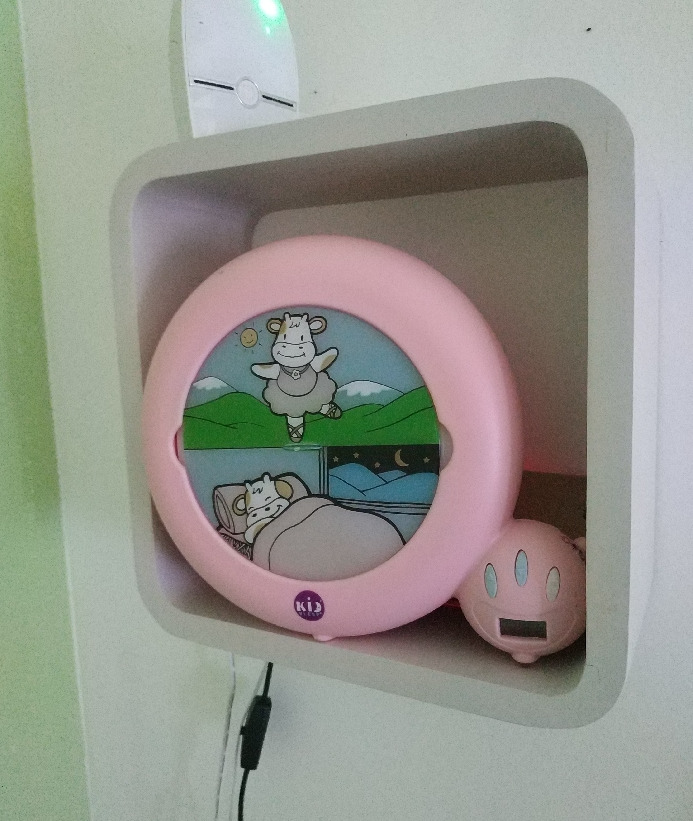
And the magic happens
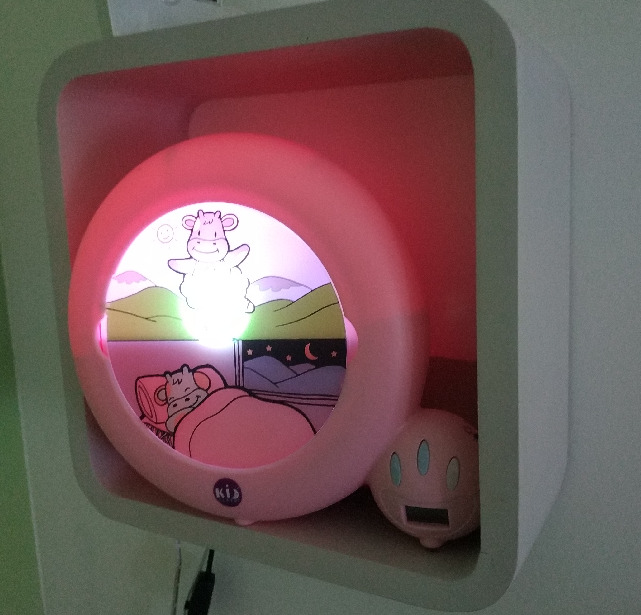
change the scheduling
I can edit the schedule manually, using
ssh -t bayberry docker exec -ti nightlight crontab -e
Or, to switch from holiday to school days crontabs, I simply can run
ssh bayberry docker exec nightlight crontab /home/sam/crontab
or
Check that the crontab is appropriately changed with
ssh bayberry docker exec nightlight crontab -l
# m h dom mon dow command
# on not school days
29 7 * * * { date && rfkill unblock wlan ; } >> /var/log/cronlog/log.txt 2>&1
30-35 7 * * * { date && /app/venv/bin/python /app/lightalmost.py ; } >> /var/log/cronlog/log.txt 2>&1
36 7 * * * { date && rfkill block wlan ; } >> /var/log/cronlog/log.txt 2>&1
59 7 * * * { date && rfkill unblock wlan ; } >> /var/log/cronlog/log.txt 2>&1
0-5 8 * * * { date && /app/venv/bin/python /app/lighton.py ; } >> /var/log/cronlog/log.txt 2>&1
6 8 * * * { date && rfkill block wlan ; } >> /var/log/cronlog/log.txt 2>&1
29 8 * * * { date && rfkill unblock wlan ; } >> /var/log/cronlog/log.txt 2>&1
30-35 8 * * * { date && /app/venv/bin/python /app/lightoff.py ; } >> /var/log/cronlog/log.txt 2>&1
36 8 * * * { date && rfkill block wlan ; } >> /var/log/cronlog/log.txt 2>&1
# get back online for a short time from time to time to be able to sync back the clock
00 12-22 * * * { date && rfkill unblock wlan ; } >> /var/log/cronlog/log.txt 2>&1
02 12-22 * * * { date && rfkill block wlan ; } >> /var/log/cronlog/log.txt 2>&1
Notes linking here
Permalink
-
↩︎Sound must be disabled to use GPIO18. This can be done in /boot/config.txt by changing “dtparam=audio=on” to “dtparam=audio=off” and rebooting. Failing to do so can result in a segmentation fault.
— https://learn.adafruit.com/neopixels-on-raspberry-pi/python-usage